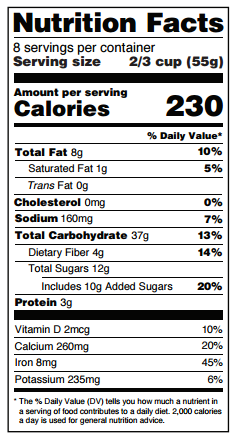Types of Carbohydrate
Starch
Foods high in starch include:
- Green peas, corn, lima beans and potatoes
- Dried beans, lentils, pinto beans, kidney beans, black eyed peas and split peas
- Grains like oats, barley and rice. (Most grain products in the US are made from wheat flour. These include pasta, bread and crackers.)
The grain group can be broken down even further into whole grain or refined grain. Whole grains contain the entire grain and are more nutritious than refined grains.
Sugar
Sugar is another type of carbohydrate. Sugar is sometimes called a simple carbohydrate. There are two main types of sugar:
- naturally occurring sugars such as those in milk or fruit
- added sugars such as those added during processing such as fruit canned in heavy syrup or sugar added to make a cake.
On the nutrition facts label, the number of sugar grams includes both added and natural sugars. Added sugar adds no nutritional value.
Fiber
Fiber comes from plants. There is no fiber in animal products such as milk, eggs, meat, poultry, and fish.
Fiber is the indigestible part of plant foods . Most of dietary fiber passes through the intestines undigested.
Adults should eat 25 to 30 grams of fiber each day. Fiber contributes to digestive health, helps to keep your bowels regular, and helps to make you feel full after eating.
Good sources of fiber include:
- Beans and legumes: black beans, kidney beans, pintos, chick peas (garbanzos), white beans, and lentils.
- Fruits and vegetables, especially those with edible skin such as apples and those with edible seeds such as berries.
- Whole grains: whole wheat pasta, whole grain cereal with three grams of fiber or more per serving, whole grain breads
- Nuts: Peanuts, walnuts and almonds are all good source of fiber and healthy fat, but watch portion sizes, because they also contain a lot of calories in a small amount.
Excellent source of fiber = five grams or more per serving.
Low-Calorie Sweeteners
When you have diabetes, including sweets in your diet requires careful planning. However, it can be hard to just save sweets for special occasions.
Foods and drinks that use artificial sweeteners are another option that may help curb your cravings for something sweet.
Sometimes low-calorie sweeteners are also called artificial sweeteners, sugar substitutes or non-nutritive sweeteners. They can be used to sweeten food and drinks for less calories and carbohydrate when they replace sugar.
The sweetening power of most low-calorie sweeteners is at least 100 times more intense than regular sugar, so only a small amount is needed when you use these sugar substitutes.
Also, with the exception of aspartame, all of the sweeteners listed below cannot be broken down by the body. They pass through our systems without being digested so they provide no extra calories.
|
Sweetener Name |
Brand Names Found |
|---|---|
|
Acesulfame Potassium |
Sunett Sweet One |
|
Aspartame |
Nutrasweet Equal
|
|
Neotame |
N/A |
|
Saccharin |
Sweet 'N Low Sweet Twin Sugar Twin
|
|
Sucralose |
Splenda |
|
Stevia/Rebaudioside |
A Sweet Leaf Sun Crystals Steviva Truvia PureVia |
Understanding “Sugar-Free”

Many foods containing low-calorie sweeteners will provide some calories and carbohydrate from other ingredients. That means foods that carry claims like "sugar-free," "reduced sugar" or "no sugar added" are not necessarily carbohydrate-free or lower in carbohydrate than the original version of the food. A food that contains no more than 0.5 grams of sugar per serving may be labeled as “sugar-free”.
Always check the Nutrition Facts Label for total grams of carbohydrate per serving.
Sugar-free products may also have sugar alcohols in them, which are used in place of sugar to sweeten foods. Sugar alcohols are carbohydrates but they are digested more gradually than regular sugar. Foods containing sugar alcohols may cause diarrhea or stomach cramps, especially if eaten in large portions.
- For the most current version of the Nutrition Facts Label, visit FDA.gov.